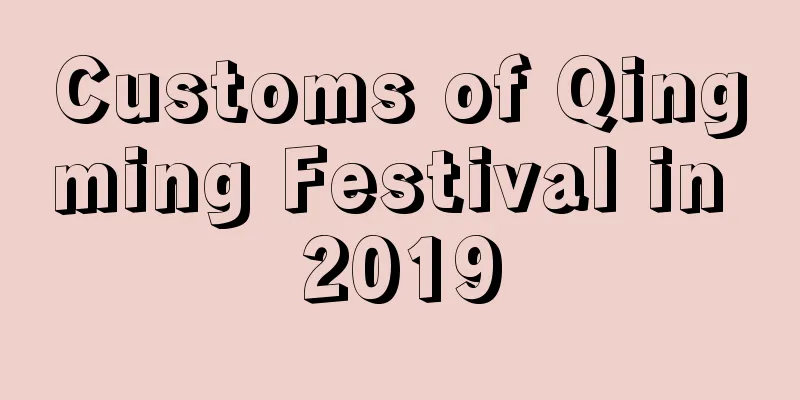Customs of Qingming Festival in 2019

|
The traditional festival of Qingming Festival is about to come. There are many customs and habits in this festival in our country, which have been passed down since ancient times. So what are the customs of Qingming Festival in 2019? Let’s take a look at it together below. Customs of Qingming Festival The customs of Qingming Festival are rich and interesting. In addition to banning fire and sweeping tombs, there are also a series of folk sports activities such as outing, swinging, Cuju, playing polo, and planting willows. According to legend, this is because no fire is allowed during the Qingming Festival. In order to prevent the cold food from harming the body, everyone participates in some sports activities to exercise. Therefore, this festival is full of unique features, with both the sad tears of visiting new graves and the laughter of outings. Tomb sweeping and ancestor worship In Chinese history, it has long been a custom to ban fire during the Cold Food Festival and to pay tribute to ancestors. After the Tang Dynasty, the Cold Food Festival gradually declined, and tomb sweeping and ancestor worship on Qingming Festival became a continuous festival tradition. The great Tang Dynasty poet Bai Juyi once wrote in his poem "Wandering in the Wilderness on Cold Food Festival": "Crows cry, magpies chatter in the dark trees, who is crying on Cold Food Festival? Wind blows paper money across the wilderness, ancient tombs are covered with green spring grass. Pear blossoms reflect on poplar trees, all of which are places of life and death separation. The cries are inaudible in the deep netherworld, people return home in the drizzling evening rain." The Song Dynasty poet Gao Juqing also described in a poem: "There are many tombs on the hilltops in the north and south, and people sweep the tombs on Qingming Festival. Paper ashes fly like white butterflies, tears and blood turn red cuckoos. When the sun sets, foxes sleep on tombs, how can a single drop of their tears reach the underworld!" Even in today's society, people still have the custom of visiting tombs to sweep tombs and worship their ancestors around Qingming Festival: weeding, placing offerings, burning incense and praying in front of the tombs, burning paper money and gold ingots, or simply offering a bouquet of flowers to express their remembrance of their ancestors. Swing Swinging is a custom of Qingming Festival in ancient my country. Swing means moving by holding a leather rope. It has a very ancient history. It was originally called Qianqiu, but later it was changed to swing to avoid taboos. In ancient times, swings were mostly made of tree branches as frames, tied with colorful ribbons. Later it gradually developed into a swing with two ropes and pedals. The swing game was already popular during the Northern and Southern Dynasties. "Jingchu Sui Shi Ji" records: "In spring, a long rope is hung on a tall tree, and men and women in colorful clothes sit on it and push and pull the rope. This is called swinging." Swinging was already a very common game in the Tang Dynasty and became an important part of the Qingming Festival customs. Since swings could be seen everywhere during the Qingming Festival, the Yuan, Ming and Qing dynasties designated the Qingming Festival as the Swing Festival, and swings were installed in the imperial palace for the empress, concubines and palace maids to play on. Swinging can not only improve health, but also cultivate courage. It is still loved by people, especially children. Cuju Ju is a leather ball made of leather and stuffed with hair inside. Cuju is kicking the ball with the feet. This was a favorite game during the Qingming Festival in ancient times. According to legend, it was invented by Huangdi and its original purpose was to train warriors. Shooting the Willow Shooting willow is a game for practicing archery skills. According to records from the Ming Dynasty, they would put a pigeon in a gourd, then hang the gourd high up on a willow tree, shoot the gourd with a bow, and the pigeon would fly out, and the winner would be determined by how high the pigeon flew. cockfighting In ancient times, cockfighting was popular during the Qingming Festival. It started from the Qingming Festival and lasted until the summer solstice. The earliest record of cockfighting in my country can be found in Zuo Zhuan. In the Tang Dynasty, cockfighting became popular. Not only ordinary people fought cockfights, but even the emperor participated in cockfighting. For example, Emperor Xuanzong of Tang loved cockfighting the most. Silkworm Flower Festival The Silkworm Flower Festival is a unique folk culture in the silkworm hometown. In the past, during the Qingming Festival, this folk activity was held in Wutong, Wuzhen, Chongfu, Zhouquan and other places. Among them, the silkworm flower fairs at Ma Ming Temple in Zhouquan and Shuang Miaozhu in Qingshi are the most splendid and grand. Ma Ming Temple is located in the west of Zhouquan Town and is known as the "King of Temples" locally. Every year, the Silkworm Festival is crowded with people and there are frequent activities, including welcoming the Silkworm God, rowing speedboats, making noise on the stage, worshiping on incense stools, boxing, dragon lanterns, high poles, singing operas and more than ten other activities. Some of these activities are carried out on shore, but most of them are carried out on boats, which is very characteristic of the water town. In recent years, the Silkworm Flower Festival in Wuzhen's incense market activities only has a few events such as welcoming the Silkworm God, stepping on the white boat, and lifting the high pole, which has great potential to be tapped. Tug of War It was called "qiangou" and "gouqiang" in the early days, and it was called "tug of war" in the Tang Dynasty. It was invented in the late Spring and Autumn Period, became popular in the army, and later spread among the people. During the reign of Emperor Xuanzong of Tang Dynasty, large-scale tug-of-war competitions were held during the Qingming Festival. Since then, tug-of-war has become a part of Qingming customs. Outing During the Qingming Festival, spring returns to the earth and nature is full of vitality. It is a great time for an outing. The Chinese people have long maintained the custom of outing during the Qingming Festival. Zhao Zhiheng, director of the Tianjin Astronomical Society, said that Qingming Festival usually occurs around the third month of the lunar calendar, which is the time when spring returns to the earth. After a long and cold winter, people go out of their homes and go outdoors to explore the breath of spring - either outing in the fields or taking a walk in the suburbs. These outings are called "outing". Outing, also known as spring outing. In ancient times, it was called Tanchun, Xunchun, etc. Legend has it that the activity of Qingming outing has existed since a long time ago. According to the "Old Book of Tang", "In the second year of Dali, on the day of Renwu in February, I went to Kunming Lake for an outing." It can be seen that the custom of outing in spring has long been popular. Du Fu has a poem that goes "After taking a walk by the river, I looked back and saw the flags." In the Song Dynasty, outing became popular. The genre painting Along the River During the Qingming Festival by Zhang Zeduan, a famous Song Dynasty painter, vividly depicts the lively scene during the Qingming Festival centered on the Bian River outside Bianjing. In this scroll, there are more than 550 people, more than 50 livestock, more than 20 boats, and more than 20 carriages and sedan chairs. The grand occasion of outing on Qingming Festival can be seen from this. Zhao Zhiheng said that since spring arrives at different times in different parts of the country, the outing festivals also come at different times. The second day of the second lunar month is the Outing Festival in Fujian, and the third day of the third lunar month is the Outing Festival in Shaanxi. Since spring comes very late in Beijing and Northeast China, people only start going outings on the fifth day of May. Because outing is a meaningful custom, it has been passed down from generation to generation. Planting willows It is said that the custom of planting willows is also to commemorate Shennong, the ancestor of agriculture who "taught people how to farm." In some places, people insert willow branches under the eaves to predict the weather. There is an old saying that goes "If the willow branches are green, it will rain; if the willow branches are dry, the sky will be sunny." Willows have strong vitality. As the saying goes, "If you plant flowers with care, they may not grow; but if you plant willows by accident, they may grow into shade trees." Willow branches will grow wherever they are planted. If you plant willows every year, shade trees will grow everywhere. There is another saying about planting willow branches and wearing willow branches on Qingming Festival: It turns out that the Chinese regard Qingming Festival, the 15th day of the seventh lunar month and the first day of the tenth lunar month as the three major ghost festivals, when all kinds of ghosts come out to claim things. People plant willow trees and wear willow trees to prevent ghosts from harassing and persecuting them. In people's minds, willow has the function of warding off evil spirits. Influenced by Buddhism, people believe that willow can ward off ghosts and call it "ghost-fearing wood". Guanyin uses willow branches dipped in water to save all living beings. In the "Qimin Yaoshu" by Jia Sixie of the Northern Wei Dynasty, it is said: "Put willow branches on the door, and all ghosts will not enter the house." Qingming is the Ghost Festival. As this is the season when willow branches sprout, people naturally plant willow branches and wear willow branches to ward off evil spirits. The Han people have the custom of "breaking willow branches as a farewell gift": Baqiao is located in the east of Chang'an and is built across the water. The Han people would break willow branches as a farewell gift when they saw off their guests at this bridge. Li Bai has a poem that says: "Year after year the willows are green, and Ba Ling is sad to say goodbye." In ancient Chang'an, there was a ten-mile-long embankment on both sides of the Ba Bridge, with a willow tree at every step. Many people going east from Chang'an would come here to say goodbye and break willow branches to give to their relatives, because "willow" and "stay" are homophones, which means to keep them. This custom originated from the "Book of Songs. Xiaoya. Cai Wei" which says "When I went away, the willows were swaying." Giving willow branches as a farewell gift expresses the reluctance to part, the reluctance to leave, and the reluctance to leave. Willow is a symbol of spring. The swaying willows in spring always give people a sense of prosperity. “Breaking willow branches as a farewell gift” implies the wish for “spring to stay forever”. The ancients used willow branches to send off their loved ones, which also meant that the loved ones leaving for their hometown were like willow branches leaving the branches. People hoped that they would quickly take root and sprout in the new place, just like willow branches that can survive anywhere. It is a good wish for friends. The ancients also mentioned the act of breaking willow branches as a farewell gift in their poems. A poem by Quan Deyu from the Tang Dynasty: "A new acquaintance gives me a willow branch as a gift", a poem by Jiang Baishi from the Song Dynasty: "I'm afraid there will be no green willow branches on the road of parting", a poem by Guo Deng from the Ming Dynasty: "Year after year I see off travelers, and break all the willow branches along the roadside in the border town." A poem by Chen Weisong from the Qing Dynasty: "How many willow branches are left now? I'm waiting to break them and give them as a gift." Not only does seeing willows cause people to feel sad about parting, but even hearing the song "Breaking Willows" can stir up their feelings of separation. Li Bai's "Hearing the Flute in Luo City on a Spring Night": "Hearing the song of willow-breaking tonight, who would not be reminded of his hometown?" In fact, willows can have many symbolic meanings, and the ancients endowed willows with various emotions, so it is reasonable to express emotions through willows. Qingming Festival is the time when willows sprout and turn green. People have the custom of picking, wearing and planting willows. When people go for an outing, they can pick a few willow branches and play with them in their hands, weave them into hats and wear them on their heads, or take them home and stick them on the door lintels or eaves. There are proverbs such as "If you don't wear willows on Qingming Festival, your beauty will turn into white hair" and "If you don't wear willows on Qingming Festival, you will turn into a yellow dog after death", which shows that picking willows on Qingming Festival was a very common custom in the old days. It is said that willow branches have the function of warding off evil spirits, so planting willow branches and wearing willow branches is not only a fashionable decoration, but also has the effect of praying for blessings and warding off evil spirits. Planting willow branches on Qingming Festival may also be related to the custom of begging for new fire with willow branches during the Cold Food Festival in the past. Today, it seems that randomly breaking off willow branches is harmful to trees and should not be encouraged. Planting trees Around the Qingming Festival, the spring sun shines, the spring rain falls, and the survival rate of planted seedlings is high and they grow fast. Therefore, my country has had the custom of planting trees during Qingming Festival since ancient times. Some people also call Qingming Festival "Arbor Day". The custom of planting trees has been passed down to this day. In 1979, the Standing Committee of the National People's Congress designated March 12 of each year as my country's Arbor Day. This is of great significance in mobilizing people of all ethnic groups across the country to actively carry out activities to green the motherland. Flying a kite Flying a kite. Flying kites during Qingming Festival is a popular custom. The book "Annals of the Capital's Sui and Autumn" written by Pan Rongbi of the Qing Dynasty records: "On Qingming Festival, men and women from all over the city go out to sweep tombs, holding wine and boxes, and looking at each other. Each of them carries a spool of kite, and after the sweeping, they fly kites in front of the tomb to compete." The ancients also believed that the wind on Qingming Festival was suitable for flying kites. "Qing Jia Lu" said: "The spring wind blows from the bottom to the top, and kites fly with it, so there is a proverb 'Flying kites on Qingming Festival'." To the ancients, flying kites was not only a recreational activity but also an act of witchcraft: they believed that flying kites could get rid of their bad luck. Therefore, many people write all the disasters and diseases they know on paper kites when flying kites on Qingming Festival. When the kite is raised high, they cut the kite string and let the kite fly away with the wind, symbolizing that all their diseases and bad spirits are taken away by the kite. Summary: The sacrificial activities for Qingming Festival are fixed, but other activities will vary in different regions. For example, outings, kite flying, and willow planting are not available in every region. |
<<: How to send red envelopes on White Valentine's Day 2019
>>: Which zodiac sign is most compatible with an Aries woman?
Recommend
12 constellations girl's Qixi date outfit matching manual belongs to your perfect date
This weekend we will usher in the annual Chinese ...
The kindest women of these zodiac signs are simple-minded and have big hearts. These women can never be "bad women"!
Some people say that the women of the following z...
What is the most compatible zodiac sign with Gemini? Love compatibility with the twelve zodiac signs
Many times when looking for a partner, you can lo...
What fruits represent the twelve zodiac signs? What is your lucky fruit?
Each fruit has its own characteristics, and each ...
2011 Love Fortune Analysis for the 12 Zodiac Signs
Having no peach blossoms makes people sad, but ha...
Jia Nailiang's proposal was successful. The 12 zodiac signs' proposal strategy
Jia Nailiang proposed to Li Xiaolu successfully a...
The twelve zodiac signs have different personalities.
Twelve constellations, twelve personalities. In t...
Dreaming about eating in a temple indicates that you will have good luck recently.
What does it mean to dream about eating in a temp...
List of auspicious days and times for June 9, 2017
What day is June 9, 2017? How about getting marri...
Gemini 2018 Horoscope: No one is better than Gemini this year
In fact, the overall fortune of Gemini this year ...
The overall trend of love and work for people born in the Year of the Rat in October 2012
Horoscope of people born in the Year of the Rat i...
Horoscope: Susan Miller Daily Horoscope 2017.8.26-8.27
If you've been in a serious relationship with...
A good name for a girl named Bian that comes from an idiom
Chinese culture is profound and extensive, and Ch...
Tang Liqi's daily horoscope 2018.06.15
Good cooperation or invitations will appear at wo...
How the 12 zodiac signs behave when they fall in love with someone If the 12 zodiac signs can do these for you, it is 100% true love
I wonder what is the most touching thing your sig...









